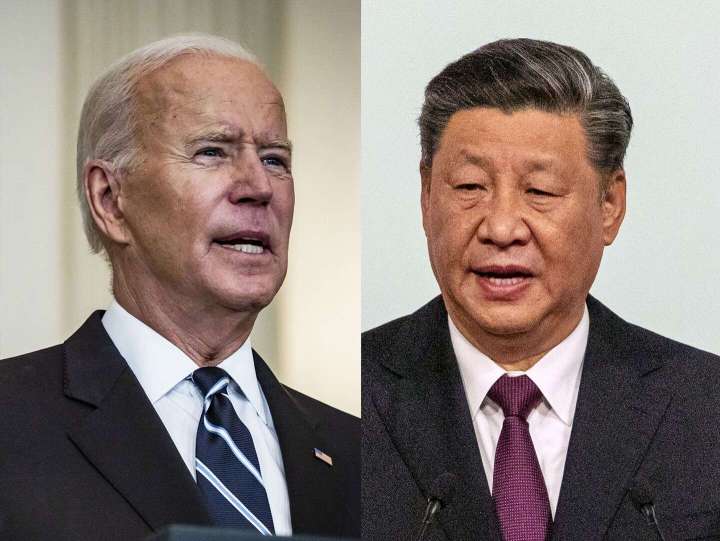TAIPEI, Taiwan — President Biden and Chinese leader Xi Jinping are expected to speak on Thursday, Eastern time, amid angry warnings from Beijing that the bilateral relationship cannot make progress unless the White House stops House Speaker Nancy Pelosi (D-Calif.) from visiting Taiwan.
Biden and China’s Xi to speak during tense Taiwan standoff

The Chinese Communist Party, despite having never ruled Taiwan, insists that the self-governing island of 23 million is part of its territory and threatens the use of force should the democratically elected administration in Taipei declare formal independence.
“If Pelosi goes, then that really will push things to the edge of a cliff and will break the relationship’s guardrails,” said Lu Xiang, research director at the Chinese Institute of Hong Kong, an affiliate of the state-run Chinese Academy of Social Sciences. He added that Beijing does not accept the argument that Biden cannot prevent Pelosi from visiting due to the separation of powers, and it instead considers her potential trip an indicator of the administration’s willingness to adhere to foundational agreements of the U.S.-China relationship.
At the end of the Trump administration, Chinese Foreign Minister Wang Yi declared that Beijing viewed the relationship as being at its worst point since the establishment of diplomatic relations in 1979. Four earlier phone calls between Xi and Biden, as well as numerous lengthy meetings between top diplomats, have not brought about a significant detente.
In a meeting with Secretary of State Antony Blinken earlier in July, Wang delivered four lists that Beijing hopes to guide the relationship, including one on “U.S. wrongdoings that must stop” and another on areas of possible cooperation if tensions are dialed down.
Progress on areas of shared concern will be impossible until the Taiwan issue is resolved, said Lu, adding that China has found Biden harder to understand than Donald Trump because the latter was “intentionally unpredictable” while the current administration appears to Beijing to be “unintentionally unpredictable” and unable to enforce a clear policy on Taiwan. He noted that the severity of the disagreement over Pelosi’s visit could cause the leaders’ call to be delayed or canceled.
The United States maintains that its one-China policy — which neither challenges nor endorses Beijing’s territorial claims and is intentionally vague about whether the U.S. military would intervene in cross-strait conflict — remains unchanged.
Xi and Biden’s last call, in March, focused on Russia’s invasion of Ukraine and the implications of the crisis for U.S.-China relations. Biden warned Xi there would be consequences if Beijing aided Russia economically or militarily in its war against its neighbor, officials said then.
White House officials have since said they have not seen “systematic efforts” to help the Russians evade sanctions and export controls.
The call also comes as Xi is preparing for a twice-per-decade political meeting, the 20th National Congress of the Chinese Communist Party, where he is expected to take on a precedent-breaking third term as general secretary of the party, affirming his position as China’s most powerful leader since Mao Zedong.
Tensions spiked this month after Beijing threatened consequences if Pelosi followed through with a planned visit to Taiwan in August, pledging to take “strong measures” in response. Although delegations of lawmakers make trips to Taiwan periodically — Sen. Rick Scott (R-Fla.) was there this month and Sen. Tammy Duckworth (D-Ill.) visited from May 30 to June 1, Pelosi would be the first House speaker to visit since Newt Gingrich (R-Ga.) in 1997.
The Biden administration has become increasingly concerned that such a trip at this time — ahead of the major party conclave in the fall — could provoke China to respond in a way that sparks a crisis across the Taiwan Strait. Defense, military and intelligence officials have laid out the risks, administration officials said. Gen. Mark A. Milley, chairman of the Joint Chiefs of Staff, personally briefed Pelosi. The USS Ronald Reagan aircraft carrier and its strike group have returned to the South China Sea after a port call in Singapore, Reuters reported Thursday.
“If Pelosi visits Taiwan, then she is pushing the envelope. In that case, Beijing will respond by pushing the envelope on the Taiwan issue, too. That’s why the Chinese military has sent a strong signal to U.S. counterparts,” said Wu Xinbo, dean of the Institute for International Studies at Fudan University in Shanghai.
Many Taiwanese security experts, however, argue that Beijing’s angry response is mostly for show and downplay the possibility that China will intervene militarily to prevent a visit with risky maneuvers like shadowing Pelosi’s plane into Taiwanese airspace. They instead suggest China will signal displeasure with scaled up saber-rattling, such as sending dozens of People’s Liberation Army aircraft deep into Taiwan’s air defense identification zone.
Taiwan’s military has said that rising concerns of a new Taiwan Strait crisis did not lead to adjustments in military preparedness drills held across Taiwan this week. In a speech on Tuesday, Taiwan’s President Tsai Ing-wen did not address concerns over the possible visit but warned of increasing “gray zone” tactics — coercive military maneuvers that stop short of outright conflict — from authoritarian nations that were upsetting the regional security balance.
“In Taiwan, the focus is more on whether the U.S. can withstand the pressure,” said Jeremy Huai-Che Chiang, a Taipei-based analyst and former researcher at the Taiwan-Asia Exchange Foundation, a think tank. “Many experts in Taiwan are surprised by the overreaction to the Pelosi trip in the U.S. think tank community.”
At stake for Taiwan is a trend of former and current officials from friendly countries who, assuming U.S. support, have made increasingly frequent visits to Taipei despite Beijing’s censure. “If the U.S. can’t stand it anymore, what signal does it send to our allies?” Chiang asked.
Ellen Nakashima in Washington, Lyric Li in Seoul and Vic Chiang in Taipei contributed to this report.






